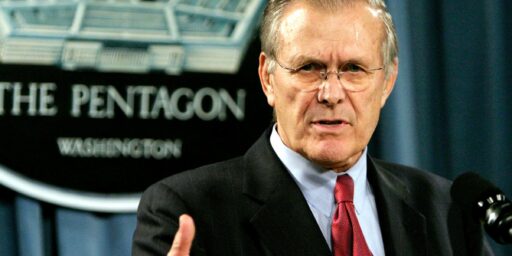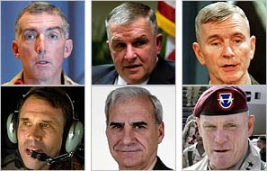General Richard Myers Chairmanship Assessed
The Los Angeles Times fronts a look at the tenure of outgoing Joint Chiefs Chairman Richard Myers, questioning his relationship with the civilian hierarchy.
General Ranked on Rumsfeld Campaign (LAT, p. 1)
Air Force Gen. Richard B. Myers is preparing to leave public service with the distinction of being the first chairman of the Joint Chiefs of Staff ever to preside over two wars. But inside the Pentagon, debate about his tenure focuses as much on a third front — guarding the uniformed military services against a hard-driving civilian leadership.
Myers’ two military campaigns, in Afghanistan and Iraq, were considered combat successes. But after serving alongside Defense Secretary Donald H. Rumsfeld, the most powerful Defense secretary in recent history, Myers has confronted questions about whether he has maintained the military-civilian balance.Rumsfeld, intent on transforming a hidebound military culture, has been called one of America’s toughest bosses by Fortune magazine. Crossing him has proved perilous for many. But when Myers has agreed with the secretary, he’s been called a toady. “I don’t need Gen. Myers’ response,” Sen. John McCain (R-Ariz.) told Rumsfeld at a hearing last year. “I know it will be exactly the same as yours.”
After four years as the nation’s top uniformed officer, Myers is wrapping up a tenure in which many Pentagon insiders say the soft-spoken Kansan has successfully performed a precarious balancing act: curbing the perceived excesses of Rumsfeld and his staff — subtly and behind the scenes — while fighting dual wars. By keeping a low profile, Pentagon strategists say, Myers avoided the tactics that cost other chiefs their jobs. When Myers does challenge the Pentagon’s civilian leadership on an issue, he wins eight out of 10 battles, said a senior Defense official close to Myers who spoke on condition of anonymity. Told of the comment, Myers countered, “I want to know what I lost.”
Myers differed with administration policymakers over treatment of prisoners held at the U.S. naval base at Guantanamo Bay, Cuba, arguing for adherence to Geneva Convention standards. He repelled a proposal by Rumsfeld to close the military service chiefs’ legal and congressional offices. And, according to several Pentagon officials, he pressed the U.S. Central Command for more detailed planning for the aftermath of the Iraq invasion.
Critics say Myers has directed a Pentagon military policy that has ceded control of decision making to President Bush and Rumsfeld, eroding a firewall designed to leave military decisions to men in uniform. Among the results, critics say, is an Iraq war in which suit-clad Pentagon strategists have bungled life-and-death decisions on troop numbers and preparations for a postwar insurgency.
In wide-ranging interviews in his Pentagon office overlooking the Potomac River and at a Kuwait airport en route to Baghdad, Myers reflected on his role as chairman over the last four years and the balance of power between the Pentagon’s military and civilian leaders. He expressed dismay that some critics judged his influence by his public appearances. “People who expect to see confrontation in a weekly press conference aren’t going to see it. That’s not where I’m going to make my stand,” Myers said. “We support the political will, and unless it’s illegal, immoral or unethical, we do what we’re told to do. That’s what the Constitution says and that’s really fundamental. You pick your times to have your arguments … and it’s not going to be in public.”
The chairman’s role lies at the heart of an ongoing debate within the military on the job of the nation’s leading officer, a post created by legislation in 1949 and first filled by Gen. Omar Bradley. Unlike former Chairman (and later Secretary of State) Gen. Colin L. Powell, who functioned as a policymaker during the 1991 Persian Gulf War, Myers confines himself more narrowly to his constitutional role as an advisor outside the chain of command. Marine Gen. Peter Pace, the low-key vice chairman of the Joint Chiefs of Staff whom Bush nominated to take over for Myers in September, is widely expected to follow suit.
“I think it’s fair to say that Myers takes a less public approach than Gen. Powell. I don’t think he’s been any less influential,” said retired Gen. Joseph Ralston, a former vice chairman of the Joint Chiefs who has known Myers for 30 years. “It is not proper, I don’t believe, for the chairman of the Joint Chiefs of Staff to have a high profile…. You offer your arguments in private and you go and support the eventual plan.” But some — including Gen. Anthony Zinni, the former U.S. Central Command chief — say Rumsfeld has turned the nation’s top military officials into “Stepford generals,” who have acquiesced in a transfer of power from uniformed officers to the Pentagon’s civilian managers.
Myers’ conception of the office squares with not only the law but a long tradition within the professional military. The Chairman and the Joint Chiefs are, contrary to popular conception, not part of the chain of command. Their function is administrative and advisory. The ultimate decisionmaking authority flows from the president (as Commander-in-Chief) to the Secretary of Defense to the 4-star combatant commanders.
The Chairman is, by statute, the chief military advisor to the president. If his view differs from that of the SecDef, he is obliged by law to offer that contrary view and defend it vigorously. Once his advice has been given, though, Myers is exactly right: If the president’s policy is legal, moral, and ethical, the Chairman will salute smartly and do what he can to support carrying it out. If he feels sufficiently strongly that the course of action the president has selected is unwise, he should resign his post and continue the fight wearing a business suit.
Further, Don Rumsfeld is not an idiot. While he has rather famously clashed with general and flag officers who have resisted his policy inclinations, he’s not about to dismiss the concerns of a Dick Myers without careful consideration. Rumsfeld, rightly in my view, has had a passion for reforming the outdated military bureaucracy. To the extent senior officers were resistant to making changes, he ran over them. That’s not the same as surrounding himself with “Stepford Generals.” The idea that Hugh Shelton, Dick Myers, or Peter Pace are weak-willed “Yes men” is absurd on its face.





Excellent point re the Joint Chiefs not being in the chain of command. The large majority of civilians and sadly, a lot of the press are unaware of that fact.
Grrrrr, McCain… let’s don’t go there.
The idea that Hugh Shelton, Dick Myers, or Peter Pace are weak-willed “Yes men” is absurd on its face.
It is? Really?
Let me be clear: I’m not saying they are. I have no idea. If I had to guess I’d say they got along well under Rumsfeld because they broadly agreed with his decisions. But how is it “absurd on its face” that the guys who attain highly political posts like the named fellows attained might be sycophants of some sort?
Jim: There’s no doubt that to rise to 4-star level, let alone JCS Chairmanship, requires incredible self-discipline and political savvy. One has to pick one’s battles much more carefully than I’ve ever been able to do.
But look at these people’s careers. Shelton spent decades as a Green Beret; Myers was a career fighter pilot; and Pace is a Marine infantryman. It’s incredibly hard to make it past captain in those lines of work without a reputation for physical courage.
I didn’t hear Myers support Gen Shinseki when he was lambasted for making his correct prediction about the number of troops needed post-OIF.
DCL: But, as Myers points out, you weren’t supposed to. If he had any disagreement with Rumsfeld, he voiced it to Rumsfeld and/or the President. He wasn’t going to hold a press conference.
I beg to disagree here. Gen Shinseki was speaking on the record as CSA. He was personally trashed by Mr. Wolfowitz, and as far as I know, he wasn’t backed by his fellow members of the JCS.
Please correct me if I’m wrong. I thought the chain of command ran from the president through the SecDef to the CINC.
The use of the term “CINC” to denote anyone but POTUS had been superceded by order of SECDEF early in the first GWB term. The head of the combattant commands are simply Combattant Commanders. Did you mean the COCOMs or were you refering to the CJCS when you said CINC?
I meant the COCOM’s
Right — from POTUS through SecDef to COCOMs. No JCS anywhere in there.
Myers and Pace are both toadys and yes men. And yes, the chain of command goes from the president THROUGH the secy of defense, or is supposed to. I have no doubt whatsoever as to their physical courage. As to their integrity, I do have doubts. I have seen a lot better than them in their posititions in my long life. They will both get well-paying jobs in the defense industry after retirement as a reward for being administration “yes men.” What a shame for our country.